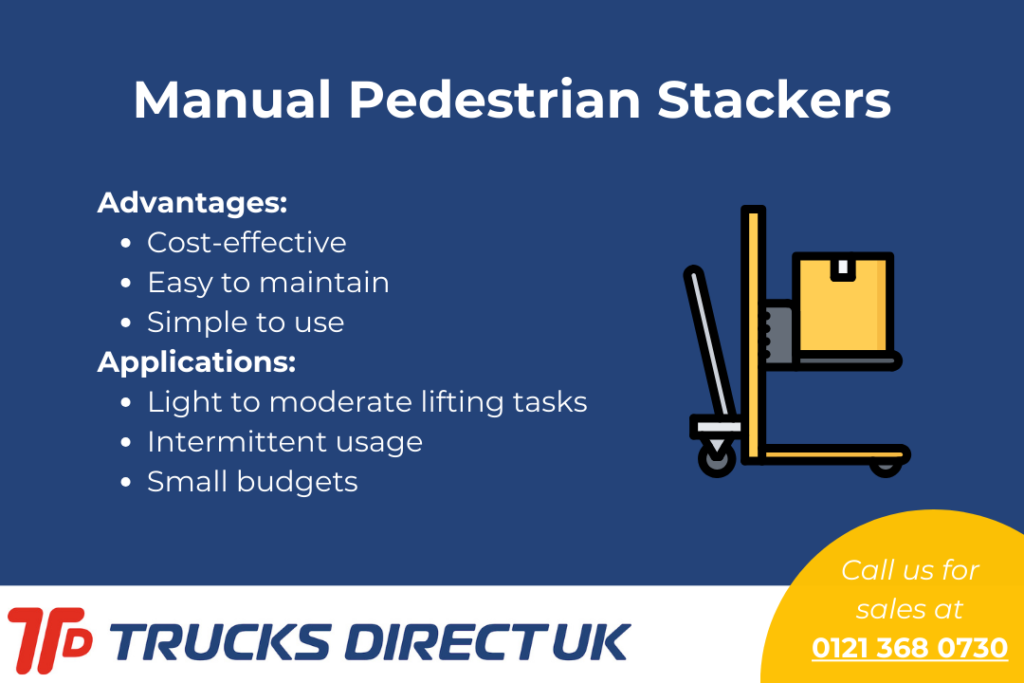Manual vs. Electric Pedestrian Stackers
Choosing the right material handler is important for the smooth operation of any warehouse. The right choice can boost productivity, ensure safety and reduce operational strain. A popular choice in the option is manual and electric pedestrian stackers.
What is a Pedestrian Stacker?
A pedestrian stacker is a piece of equipment designed for lifting, moving and stacking pallets in your warehouse. Unlike forklifts, operators walk behind the stackers. This makes them ideal for narrow aisles and tight spaces.
Manual Pedestrian Stackers

Manual pedestrian stackers are powered physically by the operator. They are normally a more affordable option and are easier to maintain compared to electric ones.
Advantages
- Cost effective: Manual pedestrian stackers typically have a lower upfront cost and reduced maintenance costs. However, they do require more physical labour to operate.
- Ease of maintenance: With fewer electronic components, manual stackers are easier to maintain.
- Simple to use: Since they are manually operated, the design makes them user-friendly and easy to use.
Applications
Manual pedestrian stackers are best suited for:
- Light to moderate lifting tasks
- Environments with intermittent usage
- Warehouses with small budgets
However, they do have limitations in terms of lifting capacities and the physical effort required when you operate them. This can lead to fatigue and reduce your productivity over long periods of time.
Electric Pedestrian Stackers

Electric pedestrian stackers offer powered lifting and movement. This can help reduce the physical strain when you are using it.
Advantages
- Increased efficiency: Electric stackers can handle heavier loads and operate faster. This can help improve your productivity.
- Reduced operator fatigue: With motorised lifting and driving, operators will experience less fatigue. Helping to improve your overall efficiency.
- Precision and control: Some electric pedestrian stackers have advanced features such as speed control. This allows you to have more precise handling and stacking.
Applications
Electric pedestrian stackers are ideal for:
- Heavy duty lifting tasks
- High volume environments that need continuous usage
- Businesses looking to maximise efficiency and reduce operator strain
Whilst the initial cost and maintenance of electric stackers is higher, there are many long term benefits. These often outweigh the cost, especially in high demanding settings.
Which Should You Choose?

Choosing between a manual and electric pedestrian stacker depends on your specific needs. You should consider:
- Budget: Manual stackers are more budget friendly. However, electric stackers are often better for long term use and in busier environments.
- Lifting requirements: Depending on your lifting requirements can determine which pedestrian stacker you need. Although, electric stackers don’t require as much physical labour and can be used for heavier loads.
- Usage: Electric stackers are the ideal choice if you are using them frequently. Whereas, manual stackers are perfect for occasional tasks.
Pedestrian Stackers at Trucks Direct
Both manual and electric pedestrian stackers have their unique advantages. When it comes to choosing the right one, make sure it meets your needs. At Trucks Direct, we offer a wide range of pedestrian stackers to suit your business. For more information on pedestrian stackers, get in touch with our team.
